Essential Skills for Excelling in Customer Service Positions in 2025

In 2025, excelling in customer service will require more than just a friendly attitude. You’ll need to master a range of skills for customer service positions to keep up with the ever-changing expectations of customers. Did you know that 75% of organizations believe a lack of transparency leads to customer churn? That’s why attributes like conflict-resolution skills and emotional intelligence will be non-negotiable. Strong customer service attributes don’t just help customers; they also boost teamwork and your overall well-being at work. Tools like Sobot’s solutions can make it easier for you to deliver a seamless customer service experience. By staying sharp and adaptable, you’ll not only meet but exceed expectations in this dynamic field.
Why Skills for Customer Service Position Are Crucial
The Role of Customer Service in Business Success
Customer service is the backbone of any successful business. When you deliver excellent customer service, you’re not just solving problems—you’re building trust and loyalty. Think about it: 96% of customers say that customer service is essential for brand loyalty. That’s huge! Metrics like Customer Satisfaction (CSAT) and Net Promoter Score (NPS) show how much of an impact good customer service has on overall business performance. For example, a high NPS means customers are more likely to recommend your brand, which directly boosts sales.
Companies like Samsung have proven this. By using Sobot’s all-in-one contact center solution, they achieved a 97% customer satisfaction rate and a 30% increase in agent efficiency. This shows how strong communication skills and the right tools can transform a customer service role into a key driver of business success.
How Exceptional Customer Service Drives Customer Retention
Did you know that 88% of customers are more likely to buy again after experiencing good customer service? That’s because exceptional service creates a positive impression that sticks. Businesses focusing on customer experience see an 80% increase in revenue. It’s not just about solving issues; it’s about making every interaction memorable.

For instance, when you use tools like Sobot’s Voice/Call Center, you can provide personalized and efficient support. Features like AI-powered Voicebots and smart call routing help you resolve issues faster, leaving customers happy and more likely to return. This kind of customer focus is what separates qualified candidates from the rest in a customer service position.
Adapting to Changing Customer Expectations in 2025
Customer expectations are evolving faster than ever. By 2025, people will expect seamless, personalized, and instant interactions. In fact, 71% of customers already expect personalized experiences, and 76% feel frustrated when they don’t get them. The rise of digital transformation has also made mobile-friendly and omnichannel service a must.
To stay ahead, you’ll need top customer-service skills like adaptability and a positive attitude. Tools like Sobot’s Omnichannel Solution can help you meet these demands. It integrates multiple communication channels into one platform, making it easier to deliver consistent and excellent customer service. With features like AI-driven chatbots and unified workspaces, you’ll be ready to exceed expectations in any customer service role.
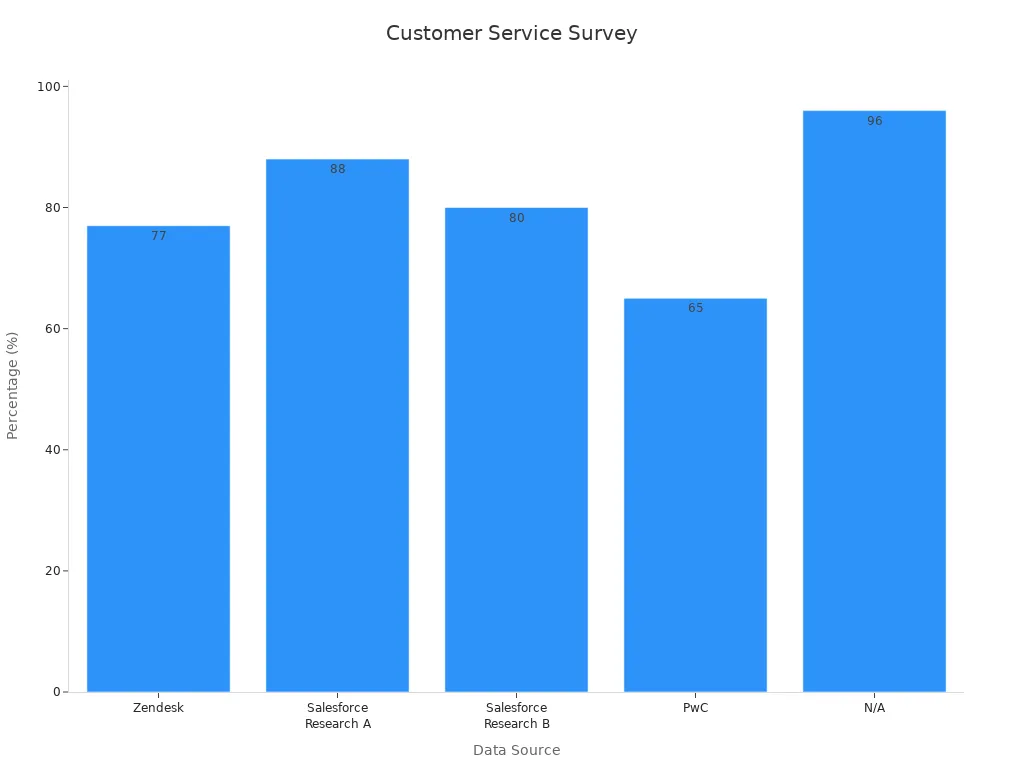
Top Customer Service Skills for 2025

Empathy and Emotional Intelligence
Empathy is the cornerstone of building strong customer relationships. When you genuinely understand a customer’s feelings, you can create a positive experience even in challenging situations. Emotional intelligence takes this a step further by helping you manage emotions—both yours and the customer’s—during interactions. Imagine a frustrated customer calling about a delayed order. By empathizing with their frustration and calmly offering a solution, you can turn a negative moment into a positive experience.
In fact, emotional intelligence plays a critical role in conflict resolution. It helps you identify the root cause of disputes and resolve them fairly. According to research, empathy is essential for de-escalating high-tension situations. For example, Sobot’s Voice/Call Center includes AI-powered Voicebots that recognize customer intent and tone, enabling agents to respond with empathy and precision. This technology ensures every interaction feels personal and thoughtful.
| Benefit of Emotional Intelligence in Customer Service Roles | Description |
|---|---|
| Empathy for Understanding Perspectives | It allows service representatives to grasp customer feelings, even when they differ from their own. |
| Motivation and Inspiration | Helps leaders and staff to inspire good work by recognizing others' motivations. |
| Conflict Resolution | Aids in identifying and resolving disputes fairly and effectively. |
By mastering empathy and emotional intelligence, you’ll not only improve customer satisfaction but also foster loyalty that lasts.
Active Listening and Clear Communication
Active listening is more than just hearing words; it’s about understanding the message behind them. When you actively listen, you pick up on subtle cues like tone and emotion, which helps you respond more effectively. This skill is crucial for creating a positive experience because customers feel valued when they know you’re truly paying attention.
Clear communication complements active listening by ensuring your responses are concise and easy to understand. For instance, if a customer asks about a product return, your ability to explain the process clearly can make all the difference. Tools like Sobot’s Omnichannel Solution enhance communication by unifying customer data across channels. This means you’ll have all the information you need to provide accurate and timely responses, boosting first contact resolution rates.
Metrics like customer satisfaction (CSAT) and first contact resolution (FCR) highlight the importance of these skills. High CSAT scores indicate happy customers, while strong FCR rates show your ability to resolve issues quickly. Together, active listening and clear communication set the foundation for effective customer service.
Adaptability and Problem-Solving
In 2025, adaptability will be your superpower. Customer needs and expectations are constantly changing, and your ability to adjust on the fly will set you apart. Whether it’s learning a new tool or handling an unexpected issue, staying flexible ensures you’re always ready to deliver a positive experience.
Problem-solving goes hand-in-hand with adaptability. It’s about digging deep to understand the root cause of an issue and finding a solution that works. For example, IKEA adapted during the pandemic by leveraging digital platforms, resulting in a 30% increase in online sales. Similarly, Sobot’s AI-driven solutions, like its Omnichannel platform, empower you to tackle complex customer queries with ease. Features like automated workflows and real-time analytics help you identify problems and resolve them efficiently.
- Adaptable customer service representatives approach each interaction with a fresh perspective, tailoring their communication to individual needs.
- A problem-solving mindset involves understanding the root cause of issues and finding effective solutions, which is essential for customer interactions.
By combining adaptability with problem-solving, you’ll not only meet customer expectations but exceed them, creating memorable experiences that drive loyalty.
Technical Proficiency in Tools Like Sobot's Voice/Call Center
In today’s fast-paced world, mastering customer service tools is no longer optional—it’s essential. By 2025, technical proficiency will be one of the most sought-after skills in customer service roles. Why? Because tools like Sobot's Voice/Call Center are transforming how you interact with customers, making your job easier and more impactful.
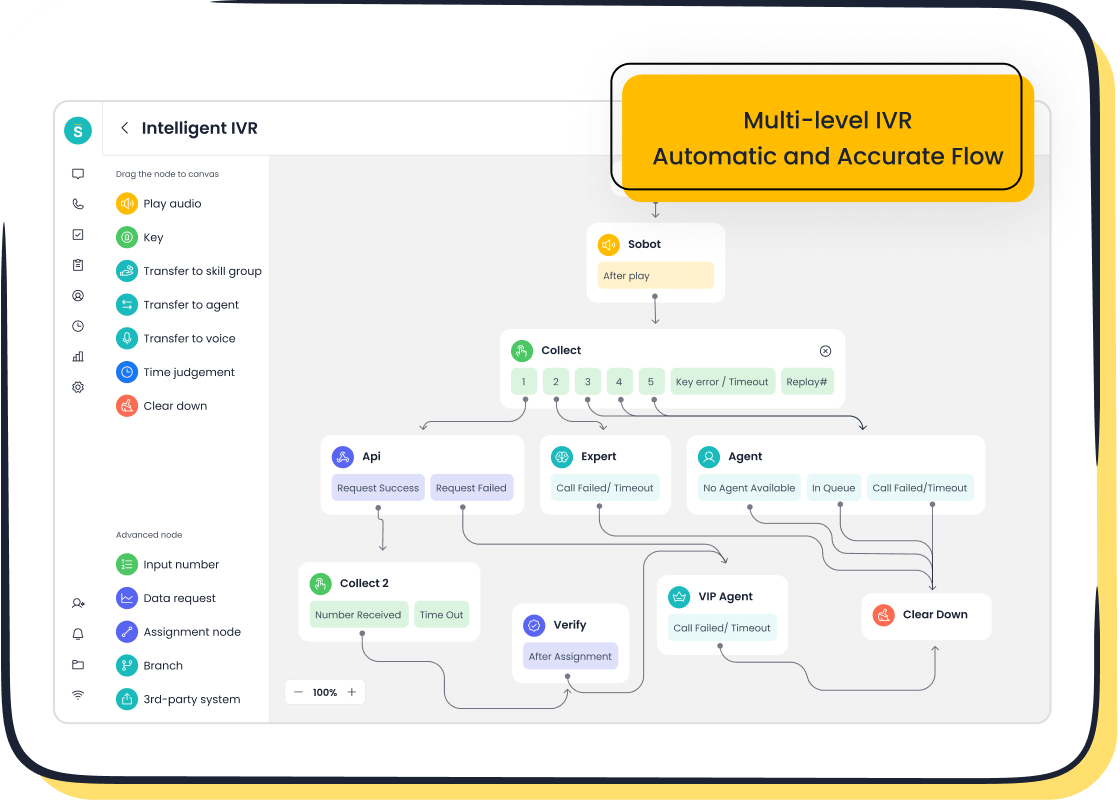
Imagine this: A customer calls with a complex issue, and instead of scrambling for information, you have everything you need at your fingertips. Sobot’s Voice/Call Center offers features like intelligent IVR, AI-powered Voicebots, and a unified workspace. These tools don’t just streamline your workflow—they also improve the customer experience. For instance, AI-powered Voicebots can recognize customer intent and tone, helping you respond with precision and empathy. Smart call routing ensures customers reach the right agent, reducing frustration and wait times.
Here’s what technical proficiency in tools like Sobot’s Voice/Call Center can achieve:
| Benefit | Statistic |
|---|---|
| Reduction in inbound discussion | 20% |
| Positive feedback rate | 96% |
| Correct answers | 80% |
| Customer satisfaction | 95% |
| Self-service question resolution | 22.2% |
| CSAT score | 97% |
| Problem-solving rate | 85% |
| Customer happiness | 99% |
| Sign-off rate increase | 35% |
| COD collection rate increase | 40% |
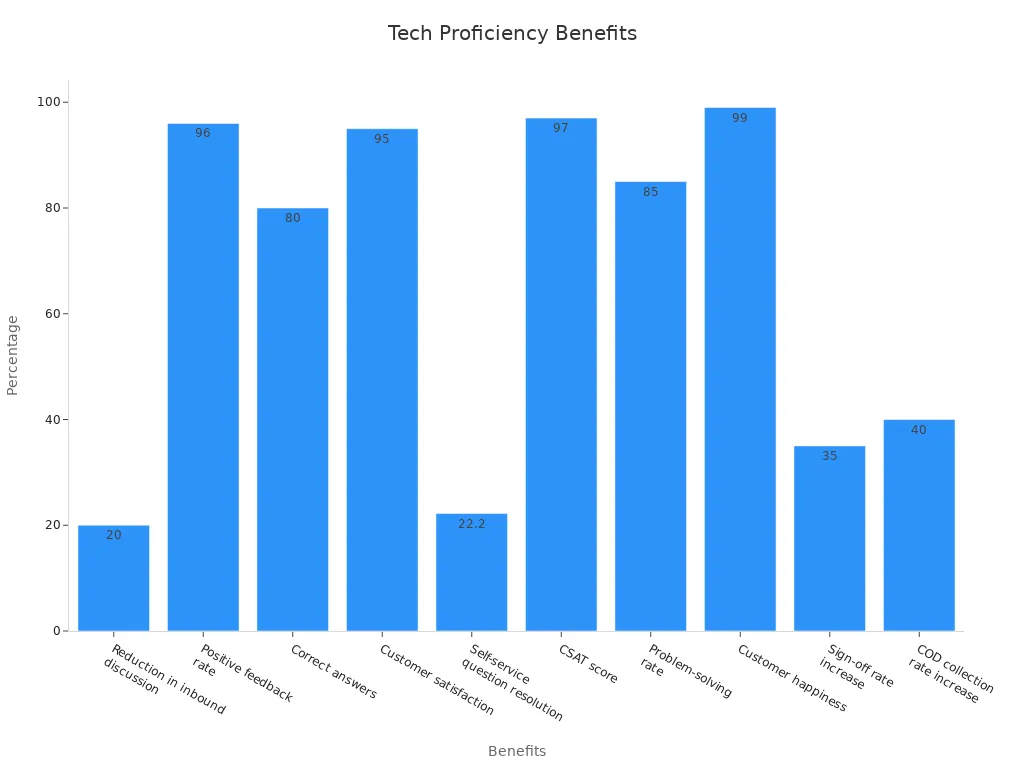
When you’re proficient with these tools, you can handle more inquiries in less time, resolve issues faster, and leave customers happier. Plus, you’ll stand out as a top performer in your role. Sobot’s solutions are designed to make this possible, offering seamless integration with existing systems and a 99.99% uptime for reliability. By investing in your technical skills, you’re not just improving your performance—you’re setting yourself up for long-term success in customer service.
Time Management and Multitasking Abilities
Time is your most valuable resource in customer service. Every second counts when you’re juggling multiple tasks, from answering calls to resolving tickets. That’s why mastering time management and multitasking is critical for excelling in this field.
Let’s face it—multitasking can be tricky. Studies show that 36% of multitaskers report becoming inattentive during remote meetings, and multitasking reduces productivity by 27.5%. But when done right, it can be a game-changer. For example, tools like Sobot’s Omnichannel Solution help you manage multiple customer interactions seamlessly. Its unified workspace consolidates all communication channels, so you can switch between tasks without missing a beat.
Here’s a closer look at the impact of poor time management and multitasking:
| Statistic | Source |
|---|---|
| 36% of multitaskers report they become inattentive in remote meetings. | Microsoft |
| Employee multitasking reduces organizations’ productivity by 27.5%. | Realization |
| An average employee spends 51% of every workday on tasks with low value. | Jobera |
| Multitasking results in 6 hours of wasted productivity each week. | Jobera |
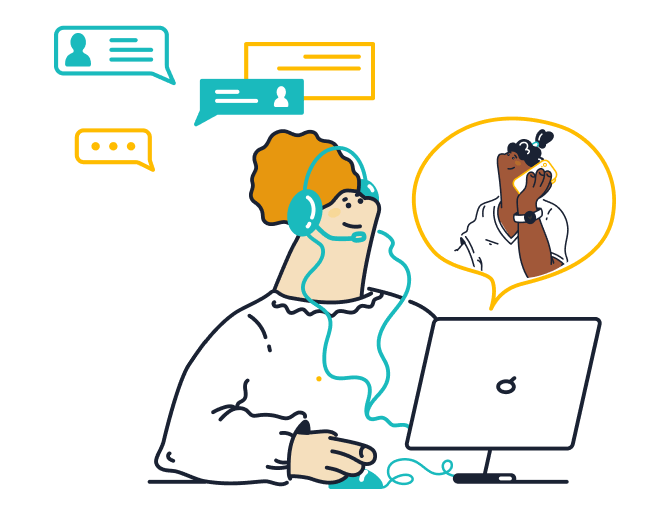
To manage your time effectively, prioritize tasks based on urgency and importance. Use tools like Sobot’s Voice/Call Center to automate repetitive tasks, freeing up time for more complex issues. Features like bulk outbound tasks and real-time analytics can help you stay organized and focused. By mastering these skills, you’ll not only improve your efficiency but also enhance the overall customer experience.
Remember, great time management isn’t just about doing more—it’s about doing what matters most. When you combine this with multitasking abilities, you’ll be unstoppable in delivering exceptional customer service.
How to Develop Customer Service Skills
Leveraging Training Programs and Online Courses
Investing in training programs and online courses is one of the most effective ways to sharpen your customer service skills. These resources allow you to learn at your own pace while staying productive at work. Whether you're looking to improve problem-solving or communication, structured training can make a big difference. For example, professional telephone skills training has been shown to enhance communication and boost customer satisfaction.
Companies that prioritize training see measurable results. Research shows that businesses investing 2-3% of their revenue in customer service training often achieve a 5-7x return. This investment not only improves your skills but also enhances brand reputation and customer loyalty. Managers can track your progress, identify skill gaps, and provide targeted support to help you grow.
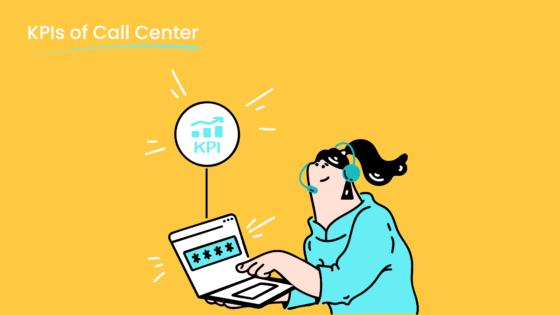
Sobot offers tools like its Voice/Call Center, which integrates seamlessly with training programs. By using features like call recording and analytics, you can review your interactions and identify areas for improvement. This hands-on approach ensures you're always learning and adapting to meet customer needs.
| Evidence | Description |
|---|---|
| 67% more likely | Properly trained employees stay longer, enhancing service consistency. |
| 2-3% revenue investment | Leading retailers see 5-7 times returns on customer service training. |
| 96% of consumers | Consider customer service vital for brand loyalty. |
Practicing Active Listening and Empathy
Active listening and empathy are the cornerstones of exceptional customer service. When you truly listen to customers, you understand their concerns better and can respond more effectively. For instance, repeating a customer's issue back to them ensures clarity and shows you're paying attention. This simple practice can make a huge difference in how customers perceive your service.
Empathy takes this a step further by helping you connect with customers on a personal level. Imagine a customer frustrated about a delayed order. By acknowledging their frustration and offering a solution, you turn a negative experience into a positive one. Regular training sessions focused on empathy and active listening can help you master these skills over time.
Sobot's AI-powered Voicebots, available in its Voice/Call Center, can even detect customer tone and intent. This allows you to respond with empathy and precision, creating a more personalized customer experience. Authentic conversations, where you remain calm and patient, foster trust and encourage repeat business.
- 60% of business problems stem from poor communication.
- Phone calls remain the preferred method for consumers to contact customer service.
- Active listening leads to better understanding and empathy, crucial for resolving customer issues.
Staying Updated on Customer Service Technology
Technology is transforming customer service, and staying updated is essential for delivering top-notch experiences. Modern tools like AI and automation streamline processes, making it easier to meet customer expectations. For example, Sobot's Omnichannel Solution integrates multiple communication channels into one platform. This ensures you can provide consistent service across email, chat, and social media.
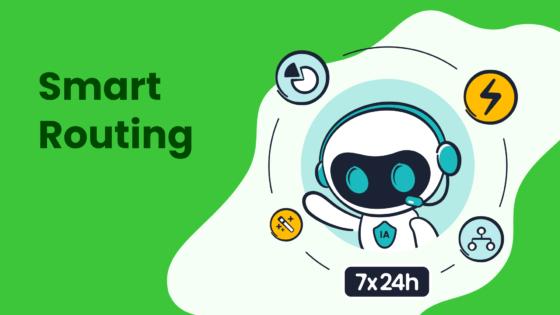
Outdated processes can slow you down and frustrate customers. By adopting tools like Sobot's Voice/Call Center, you can automate repetitive tasks, track performance, and focus on solving complex issues. Features like real-time analytics and smart call routing help you deliver faster, more efficient service.
Governments and businesses alike are recognizing the importance of modernizing service delivery. Policies like Executive Order 13571 emphasize the need for customer-centric approaches and innovative technologies. By staying ahead of these trends, you position yourself as a forward-thinking professional ready to tackle the challenges of 2025.
| Executive Order | Description |
|---|---|
| 12862 | Required agencies to gather customer feedback and establish service standards. |
| 13571 | Mandated the development of a Customer Service Plan to streamline service delivery. |
| 13707 | Called for the use of behavioral science to improve service delivery outcomes. |
Role-Playing Scenarios to Enhance Problem-Solving
Role-playing scenarios are a powerful way to sharpen your problem-solving skills. They let you practice handling real-world customer issues in a safe environment. Imagine stepping into the shoes of a customer service agent dealing with a frustrated caller. You get to test your ability to stay calm, identify the root cause of the problem, and offer a solution—all without the pressure of a live interaction.
These exercises help you think critically and adapt to unexpected situations. For example, a role-playing session might simulate a scenario where a customer is upset about a delayed delivery. You’d practice empathizing with their frustration, explaining the situation clearly, and offering a resolution like expedited shipping or a discount. This kind of hands-on training builds confidence and prepares you for similar challenges in real life.
Companies often use tools like Sobot’s Voice/Call Center to enhance these sessions. Features like call recording and AI-powered Voicebots allow you to analyze your responses and refine your approach. By reviewing your performance, you can identify areas for improvement and develop strategies to handle complex customer interactions more effectively.
Role-playing also fosters teamwork. When you collaborate with colleagues during these exercises, you learn from their perspectives and approaches. This shared learning experience strengthens your ability to deliver exceptional customer experiences, even in high-pressure situations.
Tip: Regular role-playing sessions can improve your problem-solving skills by 30%, according to industry studies. They’re a simple yet effective way to prepare for the evolving demands of customer service in 2025.
Seeking Feedback for Continuous Improvement
Feedback is your secret weapon for growing in a customer service role. When you actively seek input from customers and colleagues, you gain valuable insights that help you improve your performance. For instance, customer feedback often highlights recurring issues, allowing you to prioritize solutions that enhance the overall customer experience.
Here’s why feedback matters:
- It reveals trends that guide meaningful changes in service delivery.
- It helps you identify areas where you can improve, like communication or problem-solving.
- It fosters a culture of continuous improvement, encouraging collaboration and ownership of customer satisfaction.
When customers see their feedback influencing your actions, they feel valued. This strengthens relationships and builds loyalty. For example, if a customer suggests simplifying your return process and you implement their idea, they’re more likely to trust your brand. Tools like Sobot’s Omnichannel Solution make this process seamless. By consolidating feedback from multiple channels, you can analyze trends and take action quickly.
Feedback isn’t just for customers—it’s also vital within your team. Asking colleagues for input on your performance encourages collaboration and helps you refine your skills. A feedback-driven mindset creates a positive work environment where everyone feels empowered to contribute to better customer experiences.
Note: Studies show that businesses investing in feedback-driven strategies see a 20% increase in customer satisfaction and a 15% boost in employee engagement.
By embracing feedback, you position yourself as a proactive and adaptable professional ready to excel in customer service roles.
How Employers Can Assess Customer Service Skills
Using Behavioral Interview Questions
Behavioral interview questions are a powerful way to uncover a candidate’s true potential. By asking about past experiences, you can gauge how someone handles real-world challenges. For example, you might ask, “Can you describe a time when you resolved a customer complaint effectively?” This approach helps you understand their problem-solving skills and ability to stay calm under pressure.
Candidates’ answers often reveal their empathy and active listening abilities. When someone shares a story about helping a frustrated customer, you can see how they connect emotionally and communicate clearly. Structured interviews with consistent questions also ensure fairness and reliability in the hiring process. This method has proven effective in identifying top talent for customer service roles.
Conducting Role-Playing Exercises and Simulations
Role-playing exercises let you see how candidates perform in action. These scenarios simulate real customer interactions, giving you a chance to evaluate their communication and problem-solving skills. For instance, you could create a situation where a customer is upset about a delayed shipment. The candidate’s response will show how they handle stress and resolve issues.
Studies back up the effectiveness of role-playing. For example, the University of Michigan found that simulations improved decision-making and critical thinking. While these exercises require planning, the benefits outweigh the challenges. Tools like Sobot’s Voice/Call Center can enhance these sessions by providing features like call recording and AI-powered analysis. This allows you to review performance and offer constructive feedback.
| Benefit | Description |
|---|---|
| Empathy Training | Helps candidates understand customer emotions. |
| Critical Thinking | Encourages creative solutions to complex issues. |
| Decision-Making Skills | Evaluates performance under pressure. |
Evaluating Technical Proficiency with Tools Like Sobot's Voice/Call Center
In today’s tech-driven world, technical proficiency is a must for customer service roles. Employers can assess this by testing candidates on tools like Sobot’s Voice/Call Center. This platform offers features like intelligent IVR, AI-powered Voicebots, and real-time analytics. By using these tools during the hiring process, you can see how well candidates navigate technology to solve problems.
For example, you might ask candidates to use the platform to route a call or analyze customer data. Their ability to adapt quickly shows they’re ready for the fast-paced demands of modern customer service. Sobot’s solutions also make it easy to track performance, ensuring you hire the best fit for your team.
Assessing Communication and Listening Skills in Real-Time Scenarios
Your ability to communicate and listen effectively can make or break a customer interaction. Real-time scenarios, like handling a frustrated caller or resolving a complex issue, demand sharp skills. Active listening helps you understand the customer’s concerns, while clear communication ensures your response is both professional and actionable.
For example, imagine a customer calling about a delayed shipment. By actively listening to their frustration and clarifying the next steps, you can turn a negative experience into a positive one. This approach not only resolves the issue but also builds trust. Tools like Sobot’s Voice/Call Center enhance these interactions by providing features like call tracking and AI-powered Voicebots. These tools help you interpret customer cues and respond with empathy and precision.
Here’s a breakdown of essential skills for real-time scenarios:
| Skill | Description |
|---|---|
| Understand written information | Ability to comprehend and interpret written communication. |
| Interpret cues and listen actively | Skills in recognizing non-verbal signals and engaging in active listening. |
| Clarify next steps | Capability to summarize discussions and outline future actions. |
| Communicate using professional etiquette | Proficiency in maintaining professionalism in communication. |
Behavioral questions during interviews can also reveal how well you handle these situations. They’re more reliable than hypothetical ones because they focus on past experiences, which are strong indicators of future performance. For instance, answering, “Can you describe a time when you resolved a customer complaint effectively?” showcases your ability to listen actively and communicate clearly.
Active listening isn’t just about hearing words; it’s about resolving conflicts and clarifying points of disagreement. Whether you’re addressing a customer’s issue or collaborating with a colleague, this skill ensures smoother interactions and better outcomes.
Tip: Regular practice with tools like Sobot’s unified workspace can sharpen your communication and listening skills, making you a standout performer in customer service roles.
Leveraging Personality Assessments for Emotional Intelligence
Hiring for emotional intelligence (EI) is becoming a game-changer in customer service. Personality assessments help you measure traits like empathy, adaptability, and conscientiousness—qualities that directly impact your ability to connect with customers.
Studies show that structured interviews combined with personality assessments improve hiring accuracy by 20%. For example, Google’s Project Oxygen revealed that EI influences 70% of employee performance, proving its importance in customer service roles. Traits like openness to experience and conscientiousness account for 25% of variability in psychometric tests, highlighting how emotionally intelligent individuals excel in assessments.
Imagine using these insights during recruitment. A candidate scoring high in empathy might excel at resolving customer complaints, while someone with strong adaptability could handle unexpected challenges with ease. Sobot’s solutions, like its AI-powered Voicebots, complement these traits by enabling agents to respond empathetically and efficiently.
Note: Emotional intelligence isn’t just about hiring—it’s about fostering a culture of understanding and collaboration. When you prioritize EI, you create a team that’s ready to deliver exceptional customer experiences.
The Future of Customer Service Careers
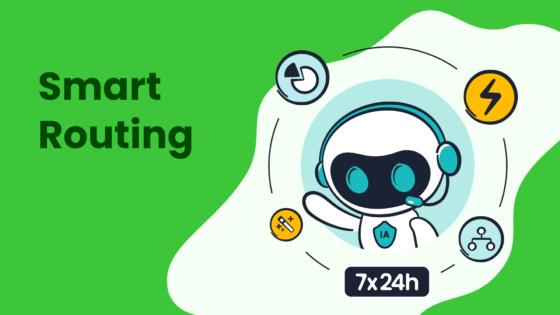
The Growing Importance of Soft Skills in Customer Service
Soft skills are becoming the heart of customer service. These skills, like emotional intelligence and interpersonal communication, help you connect with customers on a deeper level. They’re not just about being polite—they’re about understanding emotions, building trust, and creating memorable experiences.
Companies now prioritize soft skills in performance reviews because they directly impact team dynamics and employee engagement. When you show empathy and communicate clearly, you make customers feel valued. This leads to better satisfaction scores and stronger loyalty. For example, a customer upset about a delayed order will appreciate your calm and understanding response.
Sobot’s tools, like its AI-powered Voicebots, can complement your soft skills. These bots detect customer tone and intent, helping you respond with empathy and precision. By combining technology with your interpersonal abilities, you’ll deliver exceptional service every time.
The Role of AI and Automation in Customer Service
AI and automation are reshaping customer service. They’re not replacing you—they’re empowering you to work smarter. Imagine using AI to analyze customer data and uncover patterns. This helps you anticipate needs and offer personalized solutions.
Many companies are already seeing results. Delta Airlines improved passenger satisfaction by 12% with AI systems. AT&T’s chatbots resolved 80% of inquiries, cutting costs by 25% and boosting satisfaction by 15%. Even Walmart used AI to optimize its supply chain, increasing customer satisfaction by 20%.
Sobot’s Voice/Call Center is a great example of how AI can enhance your role. Its intelligent IVR and AI-powered Voicebots streamline workflows, letting you focus on complex issues. With tools like these, you’ll handle more inquiries efficiently and leave customers happier.
Staying Relevant in a Rapidly Evolving Industry
The customer service industry is changing fast, but you can stay ahead by adapting. Focus on building a customer-centric culture. Train yourself to prioritize satisfaction and loyalty. Use predictive analytics to anticipate needs and improve service delivery.
Voice assistants and multilingual support are also key. They make interactions smoother and more accessible for diverse customers. Sobot’s Omnichannel Solution integrates these features, helping you deliver consistent service across platforms.
Feedback is another powerful tool. Actively seek input from customers and colleagues to refine your approach. Combine this with professional training to stay updated on new technologies and best practices. By embracing these strategies, you’ll remain relevant and thrive in this dynamic field.
Mastering customer service skills in 2025 will set you apart in a competitive job market. Empathy, adaptability, and technical proficiency are no longer optional—they’re essential for delivering exceptional customer satisfaction. A positive attitude helps you connect with customers, while tools like Sobot’s Voice/Call Center make your work more efficient.
Continuous learning is key to staying relevant. Studies show that 87% of workers believe skill development is crucial for keeping up with workplace changes. Employers value adaptability and professional growth, especially in a fast-evolving industry. By embracing these traits, you’ll not only advance your career but also thrive in unpredictable conditions.
Sobot’s solutions, like its AI-powered Voicebots and unified workspace, empower you to meet these challenges head-on. They streamline workflows, enhance communication, and help you focus on what matters most—building lasting customer relationships.
Tip: Stay curious, keep learning, and leverage innovative tools to excel in customer service roles. Your future self will thank you!
FAQ
What are the most important customer service skills for 2025?
Empathy, adaptability, and technical proficiency top the list. Customers expect personalized and efficient service. Tools like Sobot’s Voice/Call Center help you meet these expectations by streamlining workflows and improving communication. Mastering these skills ensures you stay ahead in a fast-changing industry.
How can I improve my problem-solving skills in customer service?
Practice role-playing scenarios and analyze real-life cases. Use tools like Sobot’s Omnichannel Solution to identify patterns and resolve issues faster. Regular training and feedback also sharpen your critical thinking, helping you tackle challenges with confidence.
Why is technical proficiency essential in customer service?
Technology drives modern customer service. Proficiency in tools like Sobot’s Voice/Call Center boosts efficiency and customer satisfaction. Features like AI-powered Voicebots and smart call routing simplify complex tasks, allowing you to focus on delivering exceptional experiences.
How does Sobot’s Voice/Call Center enhance customer service?
Sobot’s Voice/Call Center offers intelligent IVR, AI-powered Voicebots, and real-time analytics. These features streamline communication, reduce wait times, and improve first-contact resolution rates. With a 99.99% uptime, it ensures reliable and efficient service delivery.
What role does feedback play in improving customer service skills?
Feedback highlights areas for growth and helps you refine your approach. Tools like Sobot’s Omnichannel Solution consolidate feedback from multiple channels, making it easier to analyze trends and implement improvements. This fosters continuous learning and better customer experiences.
See Also
Essential Strategies for Effective Call Center Quality Management
Transforming Customer Support with AI-Powered Service Agents
Discovering Leading Cloud Contact Centers for 2025
The 10 Most Effective Customer Service Software Solutions for 2024
Enhancing Efficiency with AI-Driven Customer Service Solutions
